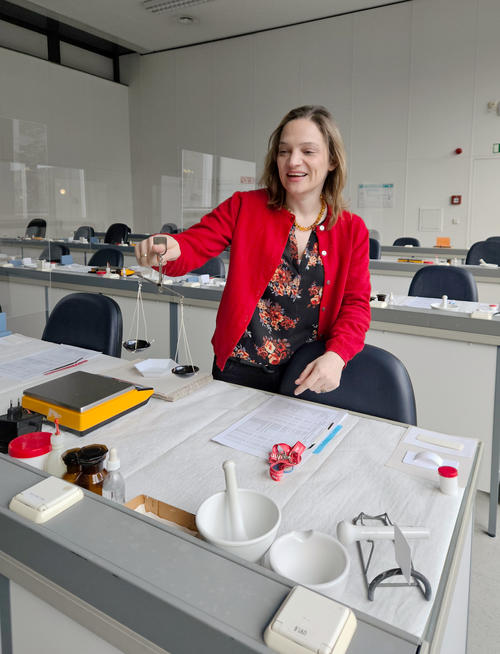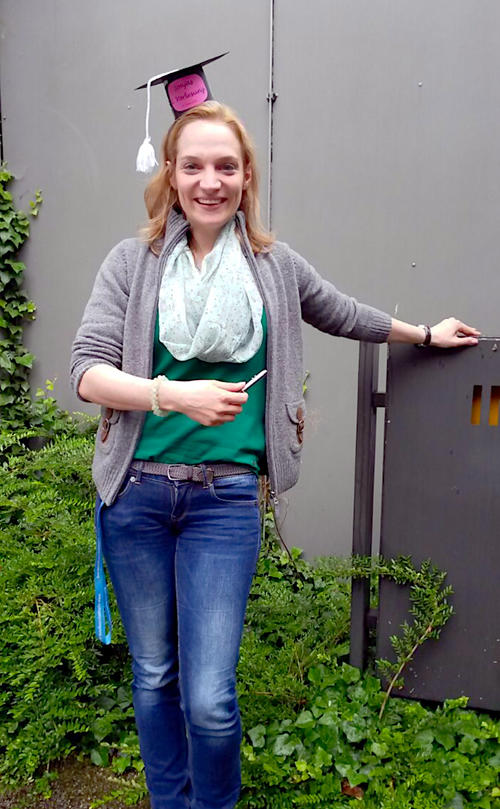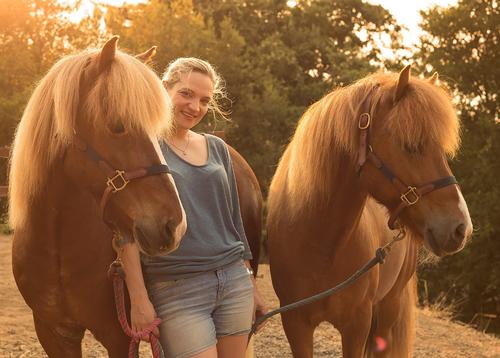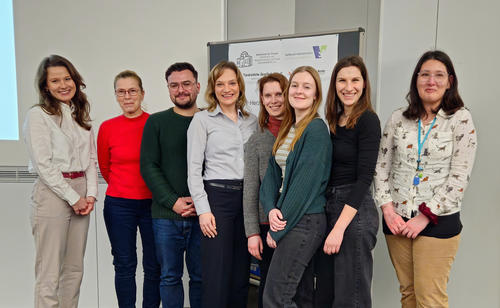Prof. Dr. Sonja Bröer: With a good mood, even a rather dry subject can be taught in a lively and practical way
Prof. Dr. Sonja Bröer in the room prepared for the Galenic Internship exam
Image Credit: Friederike Grasse
Prof. Bröer received this original doctoral hat from colleagues after her first lecture
Image Credit: privat
Prof. Bröer's biggest hobby is Icelandic horses
Image Credit: Igor Pilawski
As part of the presentation of her teaching award, Prof. Bröer invited her team on stage and thanked them warmly for their excellent collaboration
Image Credit: Friederike Grasse
"First things first: it's not just my course". Prof. Sonja Bröer starts the interview with this sentence and immediately explains why this is so important for the galenic practical course - a compulsory course for all students. The practical course teaches students how to prepare medicines. This is because veterinarians have to dilute, refill or relabel medicines as part of the veterinary medicine cabinet they have in their practice - albeit within a very restrictive framework. In the galenic internship, the students produce a powder, a solution and usually also an ointment, among other things.
"This is really team effort"
"The whole pharmacology team is really great and helps me a lot. That's why we should all accept the award together," emphasizes the professor. "It's a lot of work, especially setting up and dismantling, scraping the ointments out of the pots again, etc. Carmen Bohnwagner, technical assistant, does an excellent job of all the logistical tasks. There are many more involved, but it is mainly thanks to her that everything is where it should be. From the lab technicians to the doctoral students to the Institute Director Prof. Dr. Wolfgang Bäumer, everyone volunteers to help, walk through the rows and explain. That really is team effort."
Prof. Bröer, why is your topic your topic?Pharmaceutical law isn't really my topic, I've taken it on here. But I really like the fact that it's a topic that can be prepared in a very structured way. I think you can become an expert in this field a little faster than in a scientific-biological topic such as pharmacology. There it is more work to keep up to date due to the constant stream of new published studies etc.
Can you still remember your first lecture?Oh yes, it was at the TiHo, when I had just finished my doctoral thesis and asked my supervisor if I could give a lecture. I immediately enjoyed it. In contrast, I was a little nervous about giving scientific spokespersons, especially at the beginning of my career, e.g. in front of questions from the more experienced experts I was speaking to. But the students were and are always very fair. They only ask things that really interest them and don't hold it against you if you don't know something straight away, but then research it later and submit an answer.
My colleagues at the time had even prepared an extra doctor's hat for me as a gift. It said "Sonja's lecture" on it - because they knew I was really looking forward to it.
What do you think you do particularly well in teaching?I think it's the attempt to present a rather dry subject in a lively and practical way, i.e. to embellish it with clinical references and case studies. I also always try to be in a good mood when I give lectures. I think that carries over.
Teaching students why they need to learn something
It's always important to make it clear to students why they need to learn something. This is often rather difficult with legal texts. Of course, you can always look them up, but there are definitely things that you need to know ad hoc - because you don't have time to look them up or because they are so important that you simply have to know them beforehand. Not only for the authorities, who then check whether you are doing everything right in your pharmacy, but of course also to potentially give the animal the best treatment. There are many regulations that make us better doctors and I believe that once you have internalized this, the high learning effort is easier to master.
What did you like about lecturers back then as a student?I liked it when I had the feeling that the person was a bit passionate about their subject and was enthusiastic about teaching. If I noticed that the lecturer obviously enjoyed giving the lecture, then I also enjoyed attending the lecture more.
There were also lecturers who were always very serious and authoritarian, but who impressed me with their extremely broad knowleIs there anything you would like to pass on to your students in addition to the pure content?dge. I enjoyed going to some of them because they always told funny anecdotes and there were others who prepared the lectures particularly well didactically and I learned to appreciate the fact that I could study well for the exams with my notes.
What do you particularly enjoy about teaching and what do you dislike?I am most pleased when I see that the students are listening, having fun and asking questions. I often ask questions in the room or generate online votes using tools such as votingo. When I see that the content has been received and the students find it interesting, that's when I enjoy it the most.
I find organizational things such as organizing catch-up appointments less enjoyable. And I only enjoy correcting for the first 20 minutes.
Is there anything you would like to pass on to your students in addition to the pure content?Our students are all clever and will become very good vets, I'm sure of that. I try to teach them that knowledge also gives them the self-confidence to cope with the tasks and challenges of the profession later on. We also teach soft skills, such as communication training.



